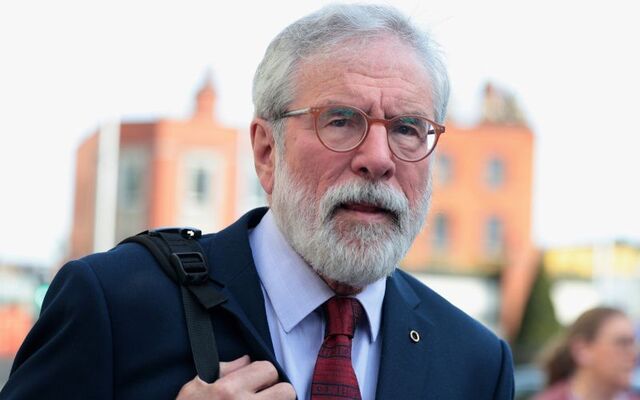Former Sinn Féin leader Gerry Adams had his reputation as a "peacemaker" unfairly attacked by a TV programme which alleged he had ordered the murder of a spy, the High Court has been told.
The Belfast-born politician took to the stand on the opening day of his defamation action against the BBC, in which he denies authorising the Irish Republican Army (IRA) to kill Denis Donaldson.
Mr. Donaldson was shot dead at his cottage in Donegal in 2006, months after admitting his 20-year role as a police and MI5 agent.
Opening the case, Mr. Adams’s barrister Tom Hogan told the jury: "Many people say many things about Gerry Adams and he may have sued before, but over time he has let matters go, usually on legal advice. But he wasn’t willing to let this matter pass."
Mr. Adams is seeking damages for BBC Spotlight documentary "Spy in the IRA," broadcast on September 20, 2016, and an article on the BBC website the following day, headed: "Gerry Adams sanctioned Denis Donaldson killing."
Mr. Hogan said Mr. Donaldson was a republican and a long-standing and senior member of Sinn Féin, who served as head of administration at the Sinn Féin offices in the North’s government buildings.
"There was a raid on the offices in October 2002," the barrister told the jury. "Mr. Donaldson and a number of others were accused of running a republican spy ring. He was accused of stealing documents and spying on the authorities."
He said the British government then suspended the North’s government but that ultimately the spying charges were dropped against Mr. Donaldson.
"However, in a bizarre twist, it turned out that Denis Donaldson had actually been spying for the British security services," Mr. Hogan said.
"The PSNI warned Mr. Donaldson that he was going to be outed as an informer, as a spy, and that his life was in danger."
He said Mr. Donaldson went to senior members of Sinn Féin and confessed that he had been an informer.
On September 16, 2005, Mr. Adams announced at a press conference in Dublin that Mr. Donaldson had been dismissed from Sinn Féin after admitting he had been a British agent, the court heard.
That same day, Mr. Donaldson told RTÉ he had been working as a British spy for 20 years.
In March 2006, a Sunday newspaper in Ireland published an interview with Mr. Donaldson and a picture of him standing outside his cottage in Donegal.
The following month, Mr. Donaldson was shot dead in his home, the court heard. The Garda investigation into the killing is still ongoing.
At the time, Mr. Hogan said that Mr. Adams was in London, meeting then British Prime Minister Tony Blair. He learned about the meeting from the then Northern Ireland Secretary, Peter Hain.
"The murder was immediately condemned by the IRA," Mr. Hogan said.
"A number of years later, the dissident Republican Real IRA claimed responsibility for the murder of Denis Donaldson."
He said that was how matters lay, until, "out of the blue," Mr. Adams received a letter in June 2016 from BBC journalist Jennifer O’Leary.
She said she was working for the Spotlight programme, and asked for his response to certain allegations, to conform with BBC editorial guidelines and ensure the programme was fair and balanced, the court heard.
She said the BBC believed it was in the public interest that the death of Mr. Donaldson be investigated.
She asked for his response to the claim the IRA army council sanctioned the IRA operation that was responsible for the death of Mr. Donaldson. Mr. Hogan said Mr. Adams did not reply. Ms O’Leary wrote again in September 2016, at which point Mr. Adams instructed his solicitors to reply, stating that he had "no knowledge of or any involvement in the killing."
The programme was then broadcast, with an anonymous source, played by an actor, claiming that he had been told the IRA killed Denis Donaldson, Mr. Hogan said.
"The anonymous source goes on to claim that murders have to be approved by the political and military leadership of the IRA, and that Gerry Adams has the final say," he said.
Mr. Hogan said the BBC had committed a "journalistic no-no" by relying on unverified claims made by an anonymous single source.
He said Mr. Adams had spent his life building a reputation as a peacemaker, "and the essence of this case is an unjustified attack on his reputation."
Mr. Adams’ evidence will continue today.
*This article was originally published on Extra.ie.




Comments